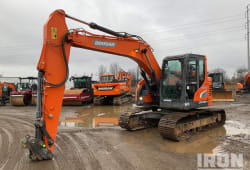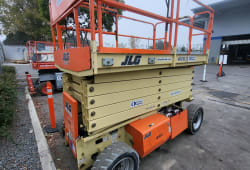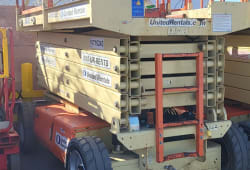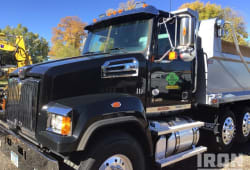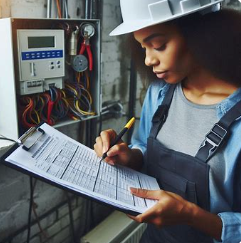Importance of Due Diligence in Heavy Equipment Buying: Inspection Tips & Advice
13 Lectura mínima
)
agosto 11, 2023
Buying heavy equipment is a significant investment that requires careful consideration and thorough research. Conducting due diligence is crucial in ensuring that you make an informed decision and avoid any potential issues with the equipment or the seller. In this article, we will explore the importance of due diligence in heavy equipment purchasing, the steps to conducting it, inspection tips, and advice for negotiating and finalizing the purchase. We will also discuss post-purchase considerations that will help you maintain and plan for future equipment purchases.
Understanding the Importance of Due Diligence in Heavy Equipment Purchasing
When it comes to buying heavy equipment, due diligence refers to the process of investigating and verifying crucial information about the equipment and the seller. It helps you assess the risks involved, identify any potential problems, and make an informed decision.
Buying heavy equipment is not a decision to be taken lightly. It requires careful consideration and thorough research to ensure that you are making the right investment. Due diligence plays a critical role in this process, as it allows you to gather all the necessary information to make an informed decision. Without due diligence, you may find yourself facing unexpected problems and expenses down the line.
What is Due Diligence?
Due diligence involves gathering relevant information about the equipment, such as its history, condition, and market value. It also includes researching the seller's reputation, ensuring that they have a good track record in selling reliable equipment. By conducting due diligence, you minimize the risk of purchasing faulty or stolen equipment.
When conducting due diligence, you should start by thoroughly inspecting the equipment. This includes examining its physical condition, checking for any signs of wear and tear, and ensuring that all parts are in good working order. It is also important to review the equipment's maintenance records to get an idea of how well it has been cared for in the past.
Furthermore, due diligence involves researching the equipment's market value. This will give you an idea of whether the asking price is fair and reasonable. You can compare prices of similar equipment in the market and use this information to negotiate a better deal.
Another crucial aspect of due diligence is researching the seller's reputation. You want to ensure that you are dealing with a reputable seller who has a history of providing reliable equipment. This can be done by checking online reviews and testimonials, as well as reaching out to other buyers who have dealt with the seller in the past.
Why is Due Diligence Crucial in Heavy Equipment Buying?
Heavy equipment is a significant expense, and any issues with the equipment can lead to costly repairs, downtime, or even safety hazards. By conducting due diligence, you can uncover any red flags or undisclosed problems before making a purchase. It also helps you gain bargaining power when negotiating the price, as you can use the information obtained during due diligence as leverage.
Imagine purchasing heavy equipment without conducting due diligence and later discovering that it has a major mechanical issue that requires expensive repairs. This could not only result in financial losses but also cause significant delays in your projects. By conducting due diligence, you can avoid such situations and ensure that you are investing in reliable equipment that will meet your needs.
Furthermore, due diligence allows you to identify any potential safety hazards associated with the equipment. This is especially important in industries where heavy equipment is used, as any accidents or injuries can have serious consequences. By thoroughly inspecting the equipment and researching its history, you can ensure that it meets all safety standards and minimize the risk of accidents.
In conclusion, due diligence is crucial when purchasing heavy equipment. It allows you to gather all the necessary information, assess the risks, and make an informed decision. By conducting due diligence, you can minimize the risk of purchasing faulty or stolen equipment, avoid unexpected expenses, and ensure the safety of your workers. So, next time you are in the market for heavy equipment, remember the importance of due diligence and take the necessary steps to protect your investment.
Steps to Conducting Due Diligence in Heavy Equipment Buying
To conduct due diligence effectively, you should follow a systematic approach that includes various steps. In this expanded version, we will delve deeper into each step, providing you with more detailed information to ensure a thorough and comprehensive understanding of the process.
Researching the Equipment's History
Start by researching the equipment's history, including its maintenance records, previous ownership, and any major repairs or accidents it may have been involved in. This information will give you insights into how well the equipment has been maintained and if there are any recurring issues you should be aware of.
When examining the maintenance records, pay attention to the frequency of servicing and the types of repairs that have been done. A well-maintained piece of heavy equipment should have regular maintenance checks and a record of timely repairs. On the other hand, a history of frequent breakdowns or major repairs could be a red flag, indicating potential future issues.
Additionally, investigating the previous ownership of the equipment can provide valuable insights. If the equipment has changed hands frequently, it might indicate that there are underlying problems or dissatisfaction with its performance. Conversely, if it has been owned by the same company for an extended period, it could be a positive sign of reliability and satisfaction.
Furthermore, it is crucial to inquire about any major repairs or accidents the equipment has been involved in. Understanding the extent of these incidents will help you assess the potential impact on the equipment's performance and longevity. If the equipment has been in a severe accident, it may have structural damage that could affect its functionality and safety.
Verifying the Seller's Reputation
Before proceeding with the purchase, it's essential to research the seller's reputation. Look for reviews, testimonials, or references from previous customers. You can also check online platforms or industry forums to see if there have been any complaints or negative feedback about the seller.
When evaluating the seller's reputation, consider factors such as their experience in the industry, their track record of successful transactions, and their overall customer satisfaction. A reputable seller will have a solid reputation built on trust and reliability. Positive reviews and testimonials from previous customers can provide assurance that the seller is trustworthy and delivers on their promises.
It is also worth investigating the seller's after-sales service and support. A seller who is committed to customer satisfaction will offer comprehensive support, including assistance with equipment setup, training, and ongoing maintenance. This level of support can significantly enhance your buying experience and ensure that you have a reliable point of contact for any future concerns or issues.
Checking for Outstanding Liens
Ensure that the equipment you intend to purchase is not encumbered by any outstanding liens. Request a lien search from the appropriate authority or consult with a legal professional to confirm that the equipment has a clean title.
Outstanding liens can present significant complications and legal issues if not addressed before the purchase. A lien on the equipment means that there is a legal claim against it, often due to unpaid debts or obligations. If you unknowingly purchase equipment with an outstanding lien, you may become responsible for resolving the debt or risk losing the equipment altogether.
Conducting a lien search is a crucial step in due diligence. It ensures that the equipment's title is clear and that you can take ownership without any potential legal entanglements. Consulting with a legal professional experienced in heavy equipment transactions can provide additional guidance and ensure that all necessary legal requirements are met.
By following these expanded steps in conducting due diligence for heavy equipment purchases, you can make informed decisions and minimize the risks associated with buying used equipment. Remember, thorough research and verification are essential to protect your investment and ensure that you acquire equipment that meets your specific needs and requirements.
Inspection Tips for Heavy Equipment
Performing a thorough inspection is a crucial step in due diligence. It helps you assess the equipment's condition and identify any potential issues that may affect its performance and safety. Taking the time to inspect heavy equipment before purchasing or using it can save you from costly repairs and ensure that the equipment meets your needs.
Visual Inspection: What to Look For
During a visual inspection, pay attention to the overall condition of the equipment, including signs of wear and tear, rust, or damage. Inspect the structural components, hydraulic systems, electrical components, and tires. Look for any leaks, loose bolts, or irregularities that may indicate underlying problems.
When inspecting the structural components, check for any visible cracks, dents, or bends. These can be signs of previous accidents or excessive stress on the equipment. Additionally, examine the welds and connections to ensure they are secure and free from any defects.
Inspecting the hydraulic systems is essential as they play a vital role in the equipment's functionality. Look for any signs of leaks, such as oil or fluid stains. Check the hoses and fittings for any wear or damage. Ensure that all the hydraulic cylinders are operating smoothly and without any jerking or hesitation.
When examining the electrical components, check the wiring for any frayed or damaged insulation. Inspect the connectors and terminals for signs of corrosion or loose connections. Test all the lights, switches, and gauges to ensure they are functioning correctly.
The tires of heavy equipment are subjected to a lot of stress and wear. Inspect the tires for any signs of uneven wear, cuts, or bulges. Check the tire pressure and ensure that it is within the manufacturer's recommended range. If the equipment has tracks instead of tires, inspect them for any signs of damage or excessive wear.
Operational Inspection: Ensuring Functionality
In addition to the visual inspection, it's crucial to test the equipment's functionality. Start the equipment and operate it, checking for any abnormalities or unusual sounds. Test all the controls, hydraulics, and safety features. If possible, simulate typical working conditions to observe how the equipment performs under load.
When testing the controls, ensure that they respond correctly and smoothly. Check if all the buttons, switches, and levers are functioning as intended. Pay attention to any delays or inconsistencies in the equipment's response to control inputs.
Test the hydraulics by operating all the hydraulic functions, such as lifting, lowering, and tilting. Observe if there are any leaks, slow response times, or unusual noises. Make sure that the hydraulics are powerful enough to handle the intended workload.
Verify that all the safety features are in proper working order. Test the emergency stop button, safety switches, and alarms. Ensure that the equipment has all the necessary safety guards and that they are in good condition.
Professional Inspection: When to Bring in the Experts
While visual and operational inspections can provide valuable insights, it's often advisable to involve professionals for a comprehensive inspection. Certified inspectors or equipment mechanics have the expertise to identify underlying issues that may not be apparent to the untrained eye. They can perform tests, assess critical components, and provide a detailed report on the equipment's overall condition.
Professional inspectors use specialized tools and equipment to conduct thorough inspections. They can perform tests such as ultrasonic testing for detecting hidden cracks or flaws in metal components, fluid analysis to assess the condition of the hydraulic and lubrication systems, and load testing to determine the equipment's maximum capacity.
During a professional inspection, the inspector will examine the equipment in detail, inspecting all the components, systems, and subsystems. They will check for any signs of wear, damage, or potential failure points. They will also evaluate the maintenance history of the equipment to determine if it has been properly cared for.
The inspector will provide a comprehensive report detailing their findings, including any issues or areas of concern. This report can help you make an informed decision about the equipment and negotiate the price based on its condition.
In conclusion, thorough inspections are essential when purchasing or using heavy equipment. Visual inspections help identify visible issues, while operational inspections ensure that the equipment functions as intended. However, for a comprehensive assessment, it is recommended to involve professionals who have the expertise and tools to perform detailed inspections and provide accurate reports. By following these inspection tips, you can ensure that the heavy equipment you invest in is in good condition and meets your requirements.
Advice for Negotiating and Finalizing the Purchase
Once you have completed your due diligence and inspection, it's time to negotiate the price and finalize the purchase.
Understanding the Market Value
Before entering negotiations, gather information about the typical market value of similar equipment. This knowledge will help you set realistic expectations and ensure that you get a fair deal. Consider factors such as the equipment's age, condition, usage, and any additional features or attachments that may affect its value.
Negotiating the Price
Armed with the information obtained during due diligence and the knowledge of the market value, negotiate the price with the seller. Be prepared to justify your offer based on the equipment's condition, any issues discovered during the inspection, or any additional costs you may incur for repairs, maintenance, or modifications.
Finalizing the Purchase: Paperwork and Legalities
Once you have agreed on the price, it's crucial to ensure that all the paperwork and legalities are in order. Review and sign a comprehensive purchase agreement that outlines the terms and conditions of the sale. It should include details about the equipment, warranties, payment terms, and any other relevant information. Consider consulting with a legal professional to ensure that the agreement protects your interests.
Post-Purchase Considerations
Your responsibilities do not end after the purchase. To maximize the lifespan and performance of your heavy equipment, consider the following post-purchase considerations.
Maintenance and Care Tips
Regular maintenance and care are essential for keeping your equipment in optimal condition. Follow the manufacturer's recommended maintenance schedule, perform routine checks, and promptly address any issues. Clean and store the equipment properly after each use to prevent rust or damage.
Understanding Warranties and Guarantees
Review and understand the warranties or guarantees provided by the equipment manufacturer or seller. Familiarize yourself with the coverage, terms, and conditions, and ensure that you comply with any requirements to keep the warranty valid. Be aware of any limitations or exclusions that may apply.
Planning for Future Equipment Purchases
As your business grows or your equipment needs expand, it's important to plan for future equipment purchases. Continuously assess your equipment requirements and consider factors such as technological advancements, market trends, and efficiency improvements. Research and stay updated on the latest equipment models, prices, and financing options to make informed decisions when the time comes.
In conclusion, conducting due diligence is crucial when purchasing heavy equipment. It involves gathering information about the equipment and the seller to make an informed decision and minimize risks. Inspection plays a vital role in due diligence and helps assess the equipment's condition and functionality. Negotiating and finalizing the purchase should be done with a clear understanding of the market value and legalities involved. Finally, post-purchase considerations such as maintenance, warranties, and future planning can ensure the optimal use and longevity of your heavy equipment. By following these tips and advice, you can navigate the heavy equipment buying process with confidence and make a wise investment.

Javier Bocanegra is Boom & Bucket's Technical Resolutions Lead, drawing on 10+ years in automotive and heavy equipment to diagnose issues, resolve complex post-sale cases, and keep machines - and customers - running smoothly. A certified heavy-equipment specialist, he's known for meticulous inspections and hands-on expertise across mechanical, electrical, and hydraulic systems. Based in Sacramento, Javier partners closely with buyers, vendors, and our field teams to deliver reliable outcomes and uphold our standards for safety and trust.


